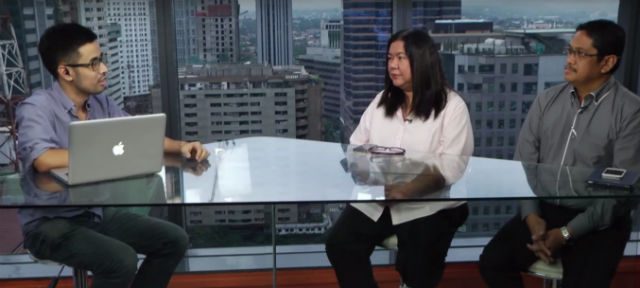SUMMARY
This is AI generated summarization, which may have errors. For context, always refer to the full article.

MANILA, Philippines – What responsibilities do job recruitment agencies have once they find overseas placement for their clients?
On August 12, Rappler Talk discussed illegal recruitment and human trafficking with migrant rights advocate Susan “Toots” Ople, and Philippine Overseas Employment Agency (POEA) Director Robert Larga. According to Ople, “human trafficking usually starts with illegal recruitment.”
“For human trafficking, you have to look at the element of exploitation. There are 3 elements that make an offense a human trafficking one. One is the act. How they were recruited. Was it done through coercion? Was fraud or deception involved? The means,” Ople said.
She explained how an illegal recruitment case can develop into a human trafficking situation.
Ople said someone can be illegally recruited “just for plain profit, and you stay in the country,” as in the case of workers who were duped with fake visas and job placements. (READ: New Zealand job applicants arrest fake recruiter)
She added: “Or you could have been illegally recruited, sent to Syria, a place where the government itself has been discouraging people to go to, where there is an ongoing civil war, and be exploited there. Your passport taken away, your freedom also taken away, and being worked without any rest and with little pay.” That is when one becomes a trafficking victim.'”
The POEA is the government agency tasked with providing benefits to OFWs as well as monitoring and supervising labor recruitment agencies in the Philippines.
Larga further explained: “The rules and regulations of POEA require licensed recruitment agencies or the deployment agencies to monitor the situation of the worker, seeing to it that the worker has been transferred to the supposed employer, and in cases where there is a need for emergency, they need to provide assistance and along this line.”
The Ople Center works with nongovernmental organizations, the private sector, and the community; and regularly conducts events to educate the public on human trafficking and illegal recruitment issues.
“The deployment of the worker doesn’t stop with the worker setting foot in the destination country,” Larga said.
One thing that may stop OFWs from reporting illegal recruiters or traffickers is the inability to afford a lawyer. To this, Largo said, “In the case of POEA, we have a legal assistance division, we have the prosecution division, [and] we have the operations and surveillance division.
He added: “Now if one would want to file a criminal case, then we can assist the person by assisting in the preparation of the complaint affidavit, we will also accompany him before the prosecutor’s office for purposes of preliminary investigation, and if the case is filed in court, we could collaborate with the public prosecutor or the prosecutors of the Department of Justice to prosecute the case in court.”
How can you seek help if you have already left the country? Ople said, “Our suggestion is that if they can find a way to contact their family so that they know you are being victimized or exploited.”
She added, “Kung hindi mo macontact yung pamilya, puwedeng macontact ang agency nila. Yung agency nila na nagpadala sa kanila sa abroad.” (If you can’t contact your family, contact the agency that sent them abroad.)
In April, the POEA issued a memorandum requiring recruiters to maintain a Facebook page in order to remain in good standing with the POEA.
Filipinos abroad or their relatives with questions and concerns can reach the POEA through its website, and through Facebook and Twitter. – Rappler.com
Add a comment
How does this make you feel?
There are no comments yet. Add your comment to start the conversation.